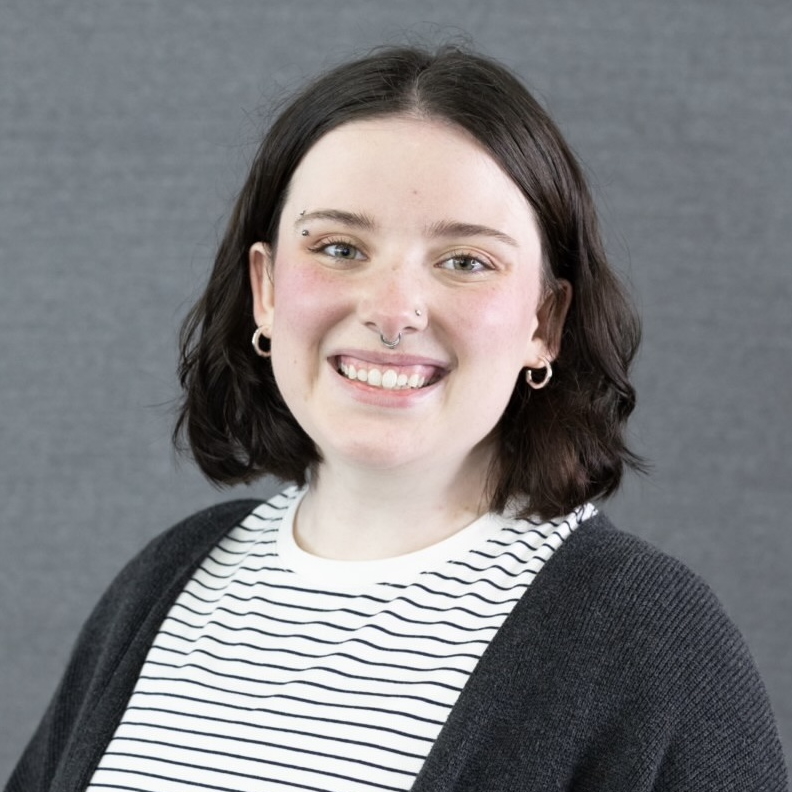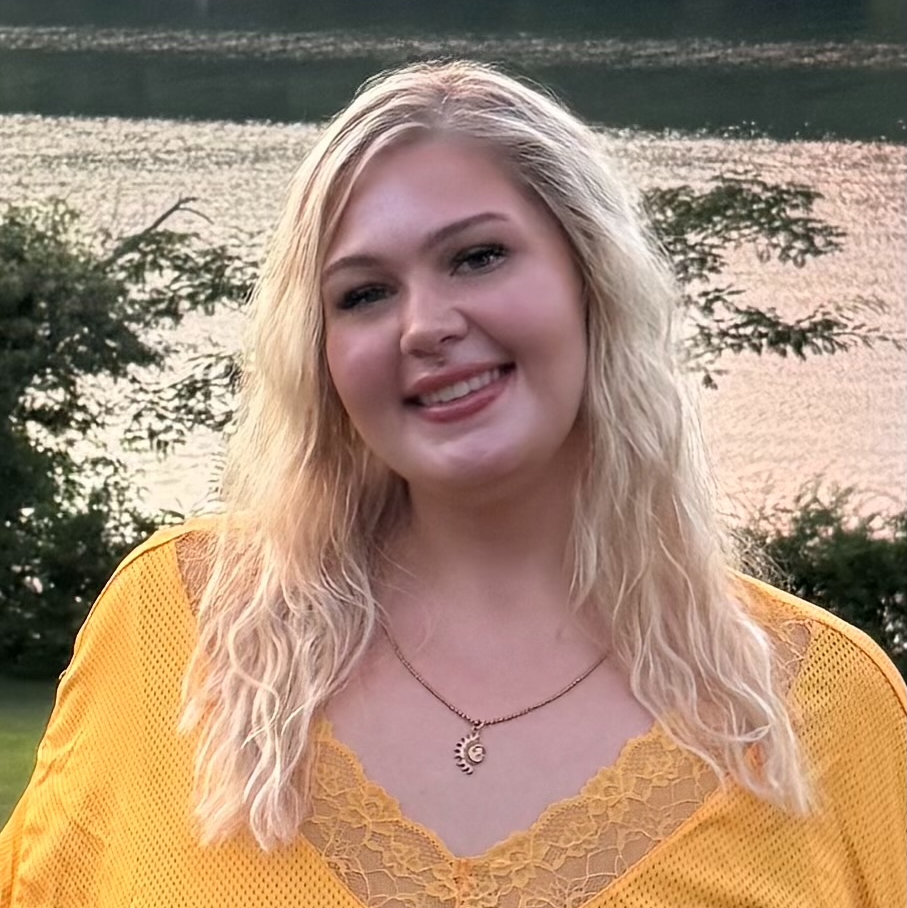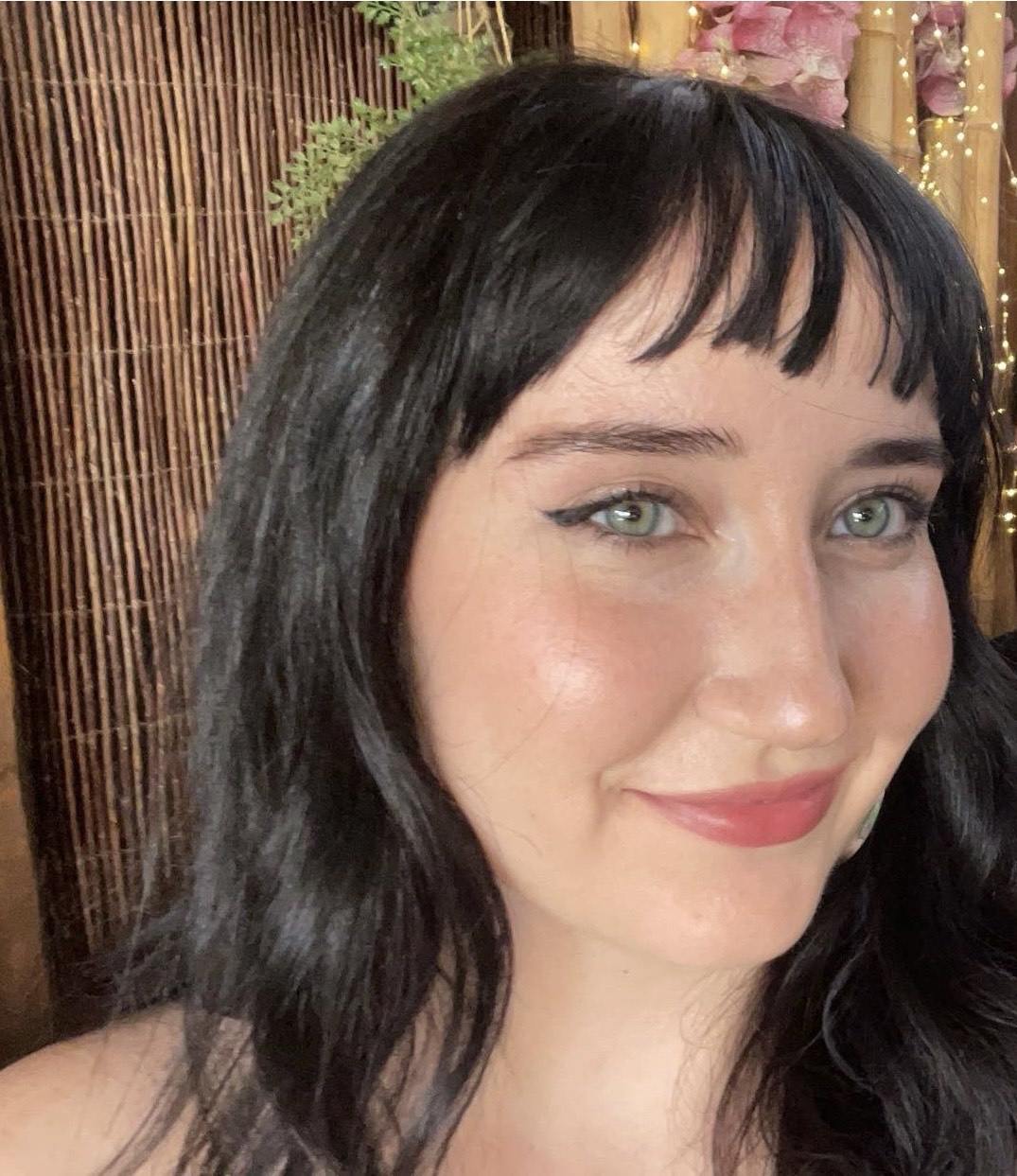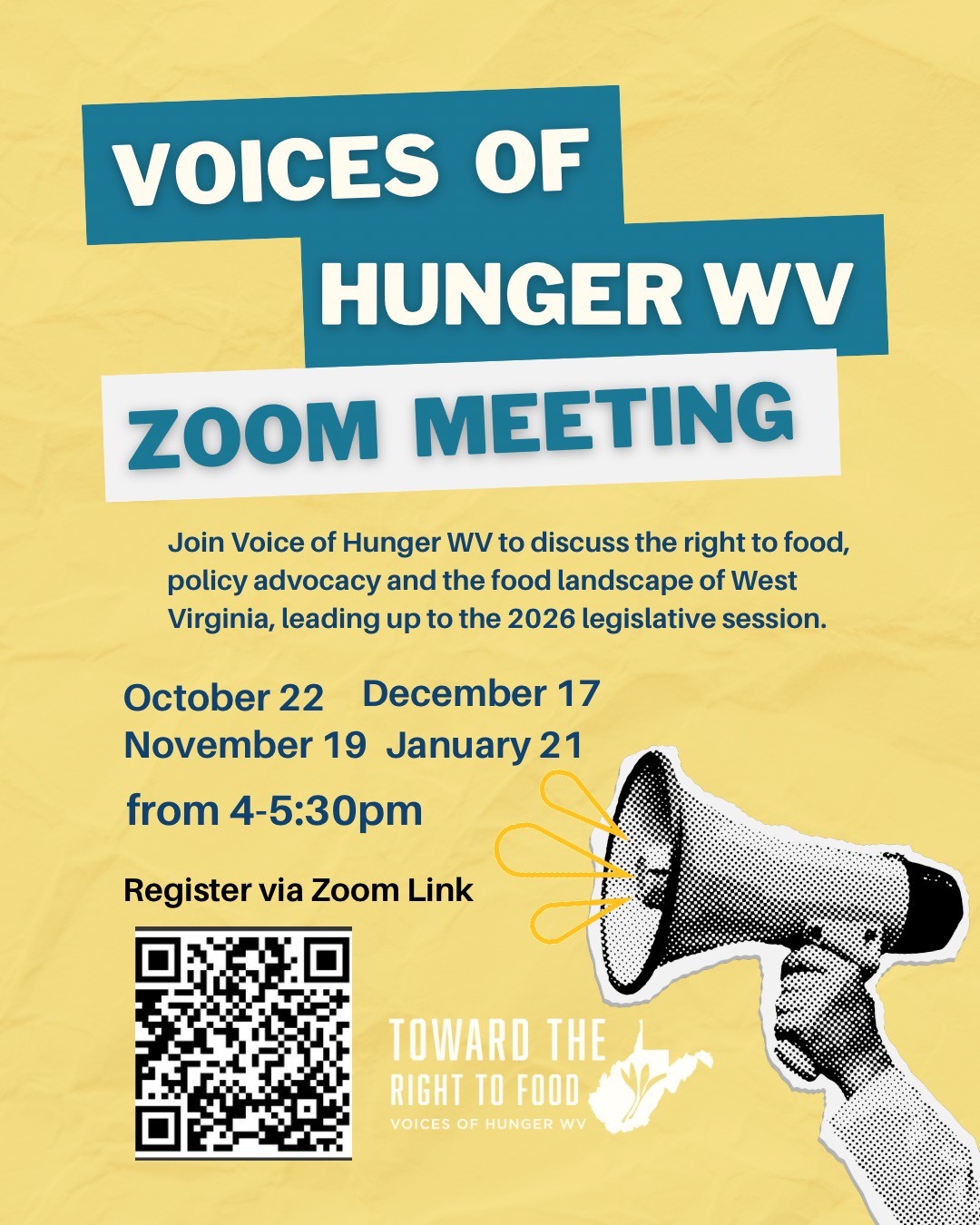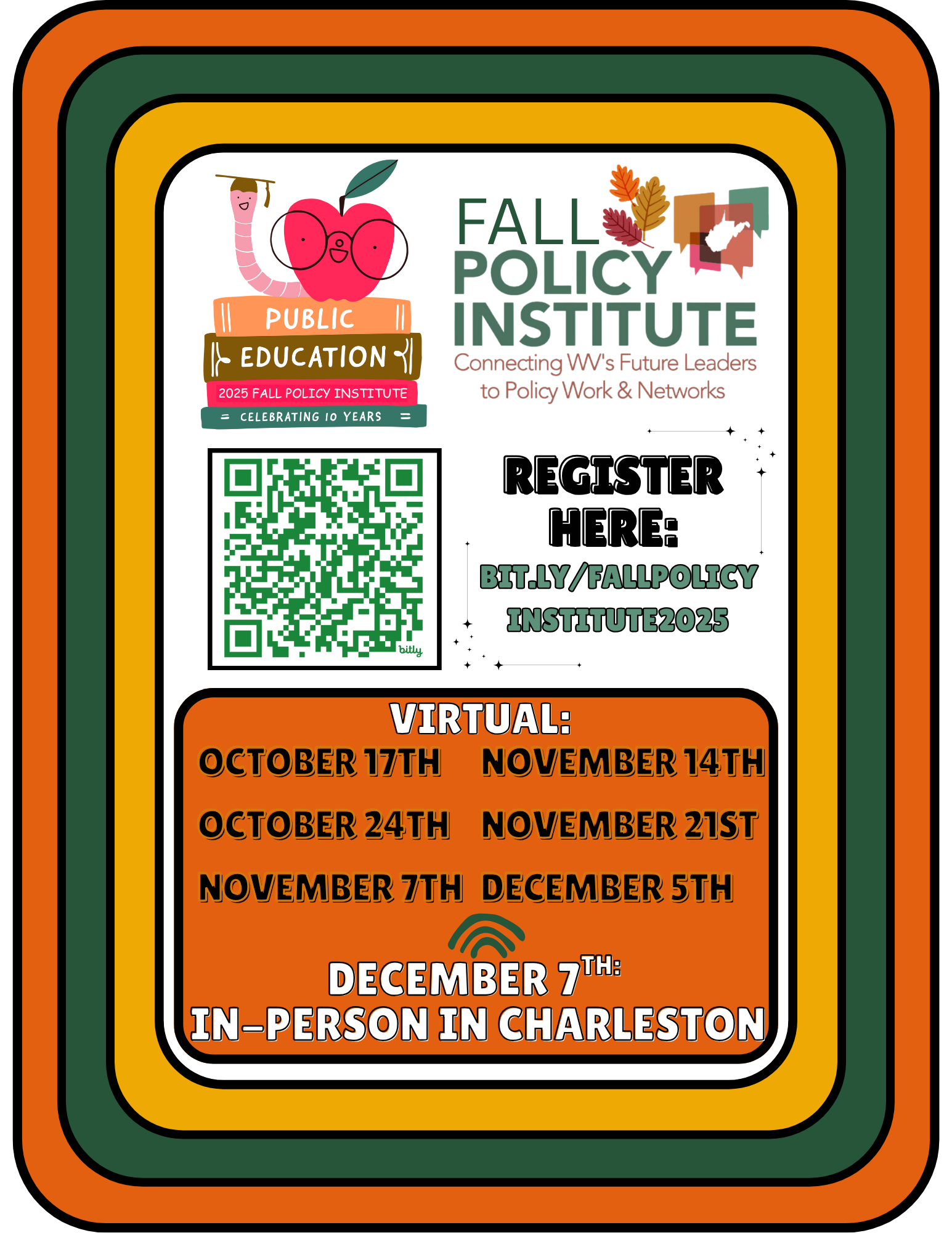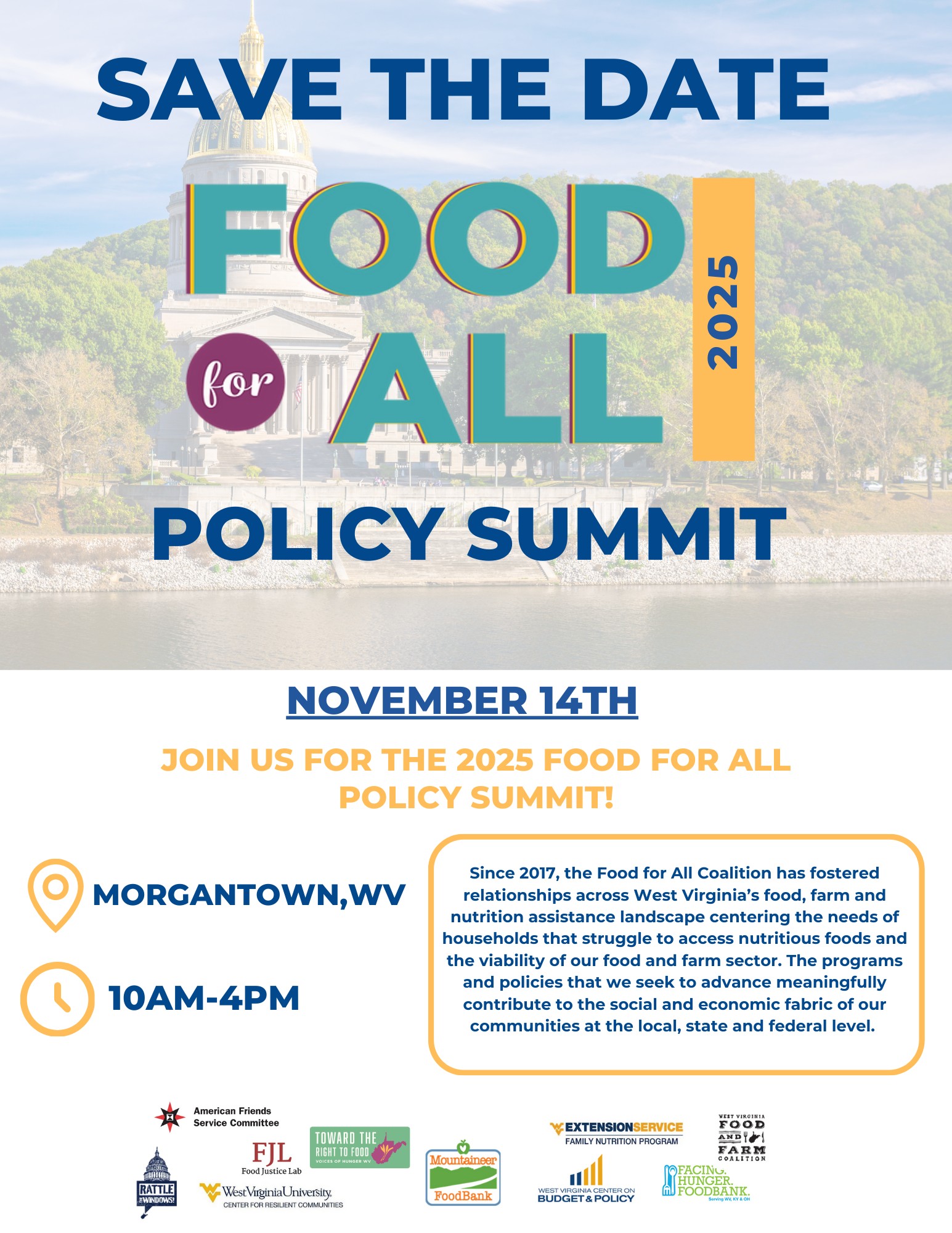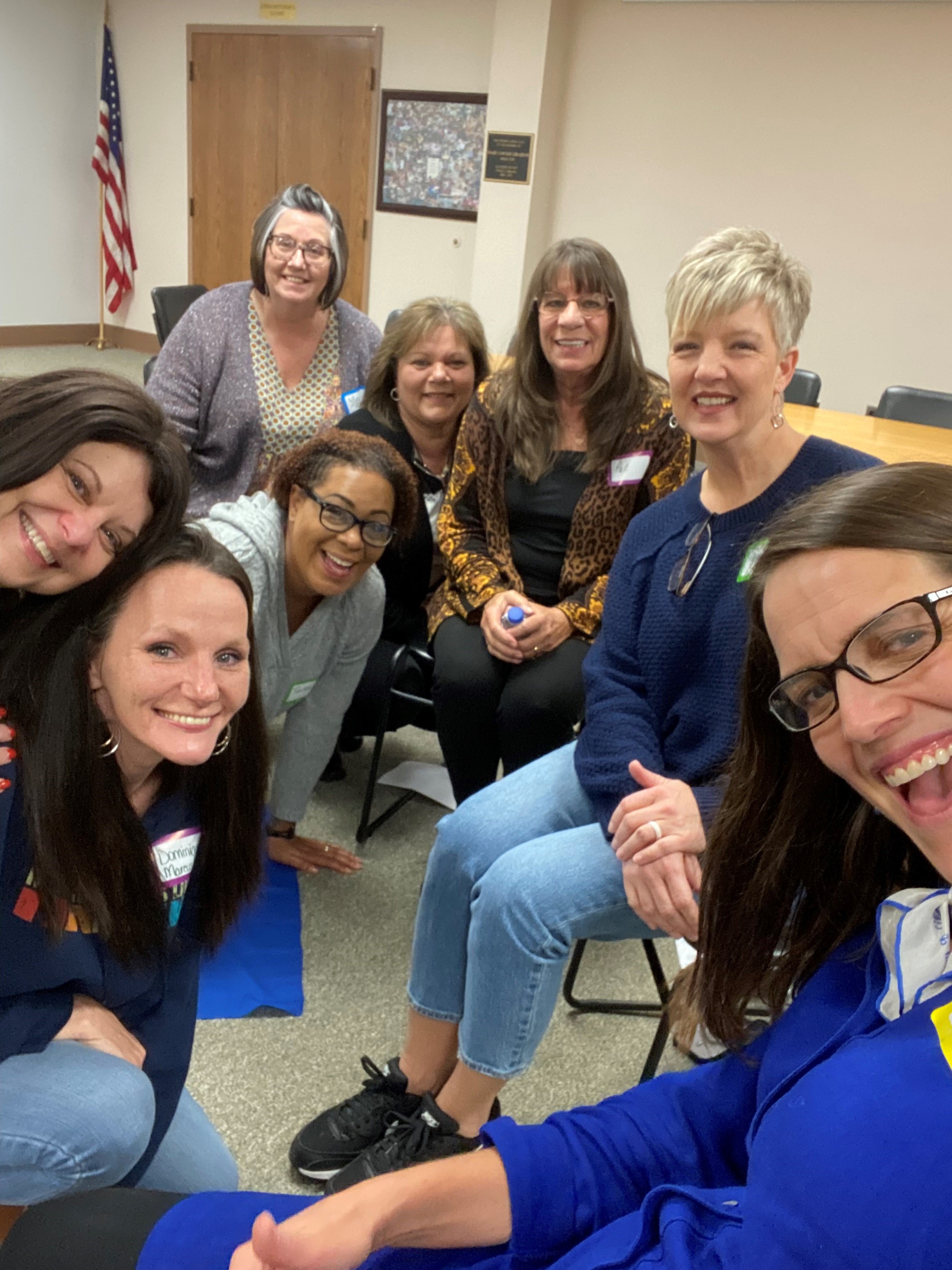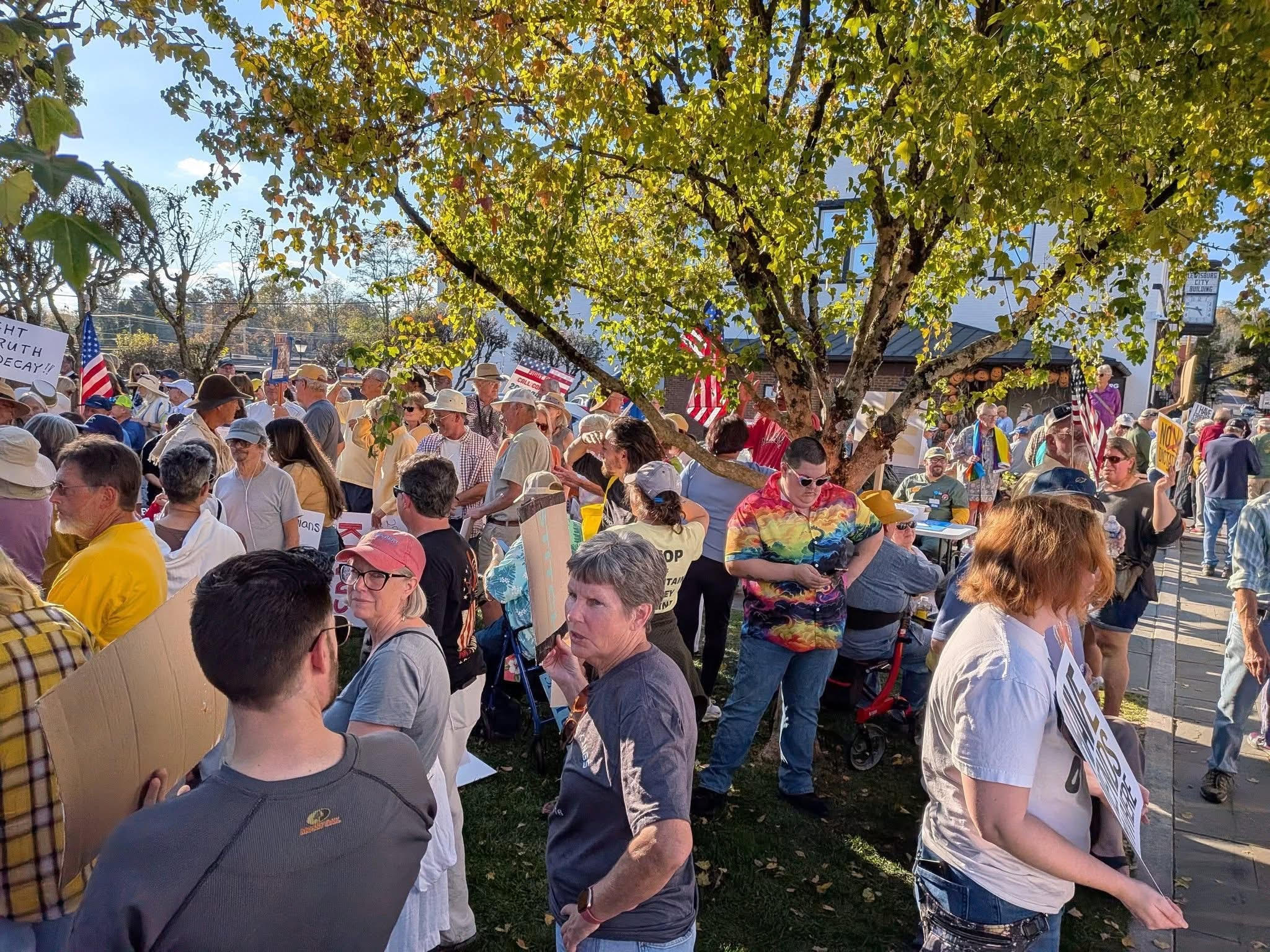
October 18th No Kings Rally, downtown Lewisburg, WV. Photo: Lyn MacCorkle
Greetings from sweet autumn in Appalachia, wherever you may roam. While on sabbatical these last three months, I’ve been living in cloud-cuckoo-land, when I did not read the news or check my email, and yes it was glorious. As I return to work, I’m feeling rejuvenated, and ready to jump back in (the country still in a downward spiral notwithstanding). For you readers who wonder what I did in addition to slacking off, while Liz and Kenny held down the fort for AFSC programs in West Virginia, I spent a lot of time outside with my kids, laid in a hammock, and read lots of books. Plus my spouse Zach and I traveled to Puerto Rico. Alas we did not get to see Bad Bunny in concert during his residency in San Juan PR.
It was pretty cool to see all the actions at the many NO KINGS rallies around the state. West Virginia was lit up on the map with events in Charleston, Huntington, Morgantown, Lewisburg, Cowen, New Martinsville, Wheeling, Elkins, Fairmont, Keyser, Romney, Shepherdstown, Bluefield, and Berkeley Springs.
You’ve maybe heard of the 3.5 percent rule from political scientists Erica Chenoweth's and Maria Stephan's research of nonviolent resistance movements around the globe. Their research found that when 3.5 percent of the people engage in forms of resistance, authoritarian regimes fail. Here is the math for us in West Virginia: the total population in West Virginia is around 1.7 million which means that if around 59,000 people are engaged in events like No Kings and other acts of protest, securing our democracy and halting authoritarianism is likely. So let’s keep turning out and inviting our neighbors to take action! Resistance is not futile.
Thinking about all the evidence supporting the power of nonviolent resistance movements, it’s helpful to remember what Gene Sharp wrote about how the nature of this power is in relationship to the inherent weaknesses of authoritarian regimes. In his book From Dictatorship to Democracy, Sharp outlines a long list that popular movements can exploit. Here are a few weaknesses of a regime that are particularly salient:
- The cooperation of a multitude of people, groups, and institutions need to operate the system may be restricted or withdrawn;
- If a strong ideology is present that influences one’s view of reality, firm adherence to it may cause inattention to actual conditions and needs;
- The general public may over time become apathetic, skeptical, or even hostile to the regime;
- Internal institutional conflicts and personal rivalries and hostilities may harm, and even disrupt, the operation of the dictatorship.
Naming some of these weaknesses can be instructive for where (and when) to put out our energy. For example the regime’s ideological obsession with targeting immigrants makes them inattentive to the harms caused by people’s healthcare subsidies going away (which will negatively impact 67,000 people in West Virginia). Niccolo Machiavelli wrote in The Prince quite succinctly in 1532 that the prince “…who has the public as a whole for his enemy can never make himself secure; and the greater his cruelty, the weaker does his regime become.”
We continue to exploit the wannabe dictatorship through strategies like supporting mass protest, holding elected officials accountable for their votes to take food and healthcare away from people, exposing the cruelty of immigration raids, and protecting those who are targeted by ICE (U.S. Immigration and Customs Enforcement). Speaking of, if you are interested in getting linked into efforts to protect immigrant neighbors, feel free to be in touch. Where I live in Greenbrier County community efforts have included accompanying people to court hearings, tracking ICE activity, and assisting with basic needs.
My first days back were spent at an AFSC-WV staff retreat in Charleston, facilitated by the inimitable Katey Lauer, and I couldn't have dreamed of a better way to jump back in. We talked about our shared work across our two programs during this errr, challenging political moment. Our sister programs the Appalachian Center for Equality and the WV Economic Justice Program team up on all things youth engagement and food justice, linking young people to policy fights and local advocacy, and promoting the right to food. If you appreciate a good flipchart, below is a peak of one from our staff retreat.
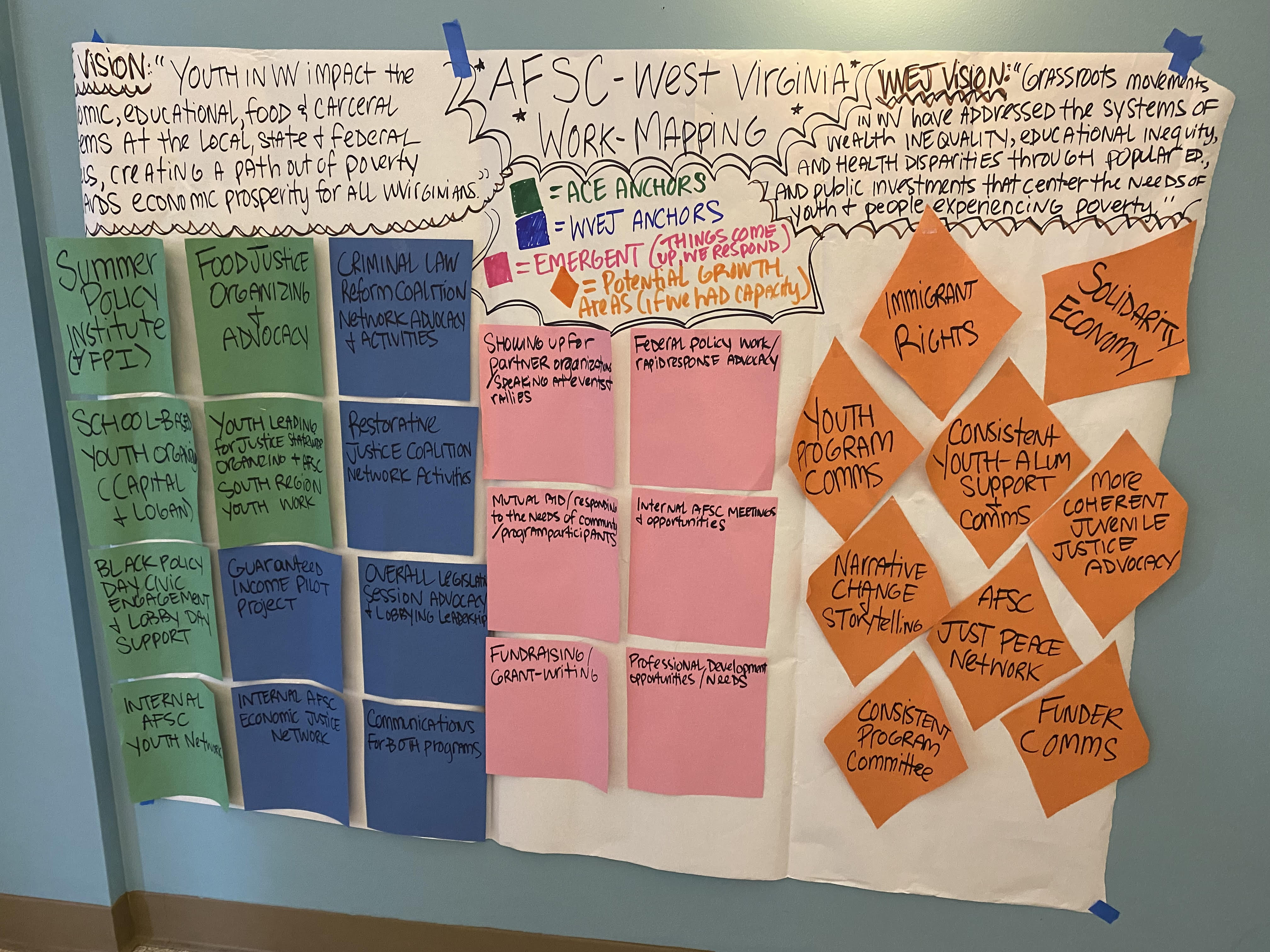
Kenny and I also got to spend time at the WV Friends Gatherings in Middleway last weekend where it was great to connect with new and old friends alike. Very grateful to the Shepherdstown Friends Meeting for hosting us. Speaking of old friends, I have new neighbors in Greenbrier County. Believe it or not Rick Wilson and Anna Meygesi just moved into their new house in Ronceverte, along with their two eyed dog Cora and one eyed cat Willie. I can hardly believe it. More good times, bad guitar playing, and epic road trips to come. And speaking of new friends, I am delighted to introduce you to some incredible people who recently joined our AFSC-WV team and are now working with AFSC's Appalachian Center for Equality program.
Molly Born
We are so excited to have Molly Born on our team. Molly brings a wealth of experience in journalism and research, and will be engaging high school students in media work and narrative story-telling. I first met Molly when she was a reporter for WV Public Broadcasting and was doing a story about the policy that restored SNAP benefits for people with drug felony convictions.
You can read more about Molly here. Molly recently got married to her long-time partner Zander Aloi so we are sending the two lovebirds heaps and heaps of well wishes for a lifetime of happiness!
Kat Curry
If you haven’t had the chance to work with Kat yet, you are in for a treat. We first had the joy of meeting Kat when they attended the Summer Policy Institute hosted at Fairmont State. Kat is the current recipient of AFSC's Padosi Fellowship, working to implement policy and programs that benefit disabled youth in Appalachia. Kat is from Logan County and a graduate of Fairmont State University.
Kat is currently helping to develop the 2025 Fall Policy Institute as well as raising awareness on the gutting of the U.S. Department of Education's Office of Special Education and Rehabilitative Services. Kat has also helped produce a series of films as part of the Together for Public Schools campaign, some of which you can view here. In their free time, Kat enjoys reading, pottery, fiber arts, and spending time with their friends and family. Welcome, Kat!
Kirstyn Ooten
The AFSC team is over the moon that Kirstyn Ooten is now “officially” working with us. Liz first met Kirstyn through AFSC’s youth program at Tug Valley High School when Kirstyn was a student participant. Kirstyn stayed involved in the program over the years and more recently was a member of AFSC’s program committee.
Kirstyn lives in Kermit, WV and will be building up ACE’s youth alumni network and connecting youth to local campaigns to help build their advocacy and organizing chops. Welcome, Kirstyn!
Carolina Rascon
Carolina (pronounced CarolEEna) brings so much to the table at AFSC. She is a right to food advocate and project coordinator for Voices of Hunger WV. Carolina has a Regent Bachelor of Arts from West Virginia University. During her time as an undergraduate she experienced food insecurity, leading her to food justice work.
As an undergraduate research assistant with the Food Justice Lab she collaborated on several projects, including the passing of the Morgantown Right to food municipal resolution in 2021. She spent two years as an AmeriCorps VISTA at The Rack: WVU Student Food Pantry, building data systems and education tools to support the pantry’s growth. Join Carolina and other food justice advocates for an upcoming series that starts tomorrow. Read on for details. And give Carolina a warm welcome!
Voices of Hunger WV Zoom meetings
Voices of Hunger WV with support from AFSC is facilitating monthly learning exchanges about the rules of our food system, who writes them, which agencies interpret them, and what it means for advancing community food security networks in West Virginia. REGISTER HERE and direct any questions to Carolina rasconcarolina21@gmail.com.
Here's a look at the schedule:
Oct. 22nd: How the Federal Government Shapes the Food System
Nov. 19th: Congress and the Big Food Policy Levers
Dec. 17th: What's Happened since January?
Jan. 21st: States as Food Policy Laboratories
Fall Policy Institute Advocacy
Not being limited by the season, the Summer Policy Institute is hosting “Lunch & Learn Workshops” and an in-person advocacy at the State Capitol on Dec. 7th. Join the fun by registering here for any or all of these virtual sessions:
- Education Data & Budget 101 / 201: Oct 24th | 12:00pm
- Navigating the Legislative Website & Bill-tracking: Nov 7th | 12:00pm
- Educational Decisions + School Funding Formula: Nov 14th | 12:00pm
- Legislative Advocacy / Citizen Lobby Tactics: Nov 21st | 12:00pm
- The “Art” of the Meeting & Panel: Dec 5th | 12:00pm
- In-Person Advocacy Day! Dec 7th | Time & Details TBD
Food for All Summit 2025
We are excited to be back in Morgantown this year for the Food For All Summit on November 14th. AFSC has been involved with the Food for All coalition since it started in 2017 and it's an understatement to say a lot has changed, even since we last gathered in 2024. Back in 2017 we were winning victories for expanded food access, successfully defeating attempts to curtail SNAP eligibility, and even helped form a Hunger Caucus within the legislature.
At this year's summit we'll review what food programs have been cut and gather input on how to hold those in power accountable who voted to take food away from West Virginians. Yes we are keeping score. We will also celebrate the many creative and compassionate ways people are acting locally to feed folks. Don’t miss this chance to learn, connect, and help strengthen West Virginia’s food system. Register here!
Celebrate Restorative Justice Week
The work of the WV Restorative Justice Project continues, organizing ways for people to learn about and experience restorative practices. Last year it was cool to have nearly 100 people circling up at the same time in 17 different towns around the state. Pictured here is yours truly in Beckley with some amazing women who convened for a community talking circle at the Raleigh County Library.
Coming up on November 17th you can find a community talking circle near you. Register here to find the closest circle near you. Also, read all about it! Our dear friend Brenda Waugh just published a book. Becoming a Restorative Lawyer: How to Transform Your Legal Practice for Self, Client, and Community Growth is a must read for you lawyers out there. Congratulations Brenda, proud to know you.
Last but not least, this coming Monday, October 27th there will a celebratory lunch in Charleston at John XXIII retreat and pastoral center where we will honor Jeff Allen since his retirement from the WV Council of Churches. Sonnets and songs could be written about all that Jeff has accomplished and the care he has demonstrated during his tenure as Executive Director of the WVCC. In honor of Jeff, there is an endowment fund at the United Methodist Foundation of West Virginia which will support child health initiatives and other activities of the West Virginia Council of Churches. Checks may be mailed to:
Jeff Allen Fund c/o UM Foundation of WV
500 Virginia Street E, Suite 750
Charleston, WV 25301
Online donations can be made here. Be sure to write "Jeff Allen Fund" in the "Please Specify the Fund" box.
In lieu of a sonnet, and to be consistent with including poetry in these missives, here is a haiku for Jeff:
Our dear Jeff Allen
The mountains sing songs for you
Echo, justice, PEACE!
Thanks for reading. Stay inspired. See you soon. We are in this together!
In solidarity,
Lida Shepherd
Learn more about the West Virginia Economic Justice Project and sign up for updates.

